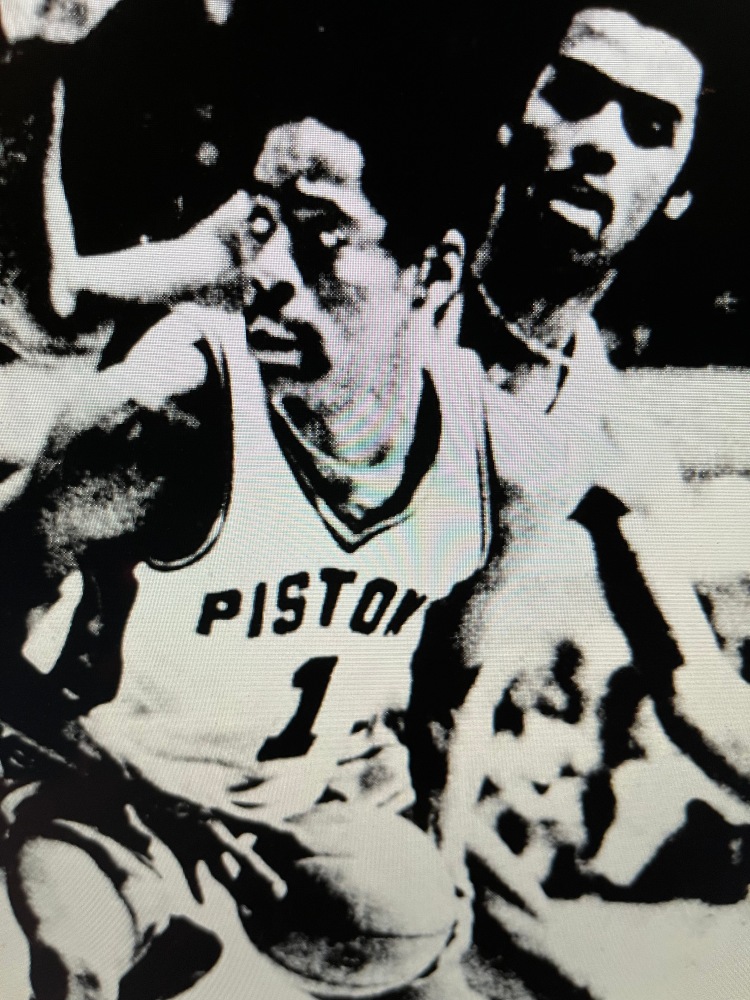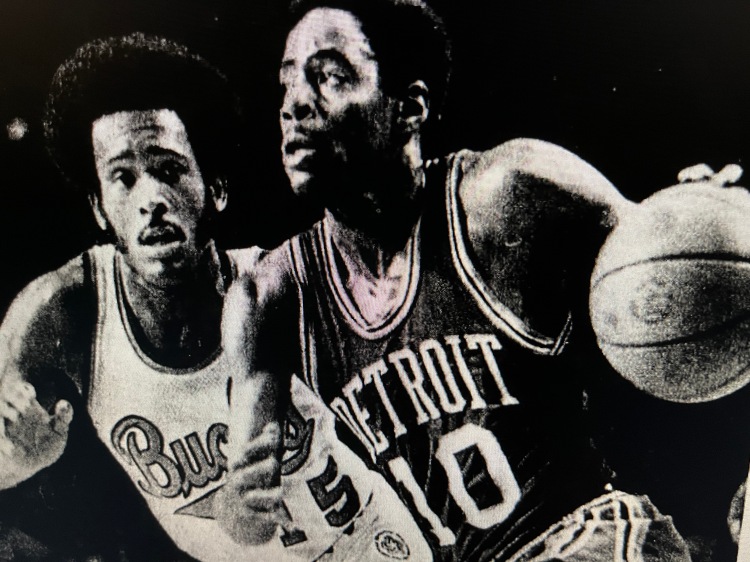[I have a great article tucked away somewhere in my files on Kevin Porter as a rookie guard with the 1972-73 Baltimore Bullets. After a week of intermittent searching, I can’t find it. Too bad, the article would have served as a nice intro for to one of the NBA’s all-time great assist men. When I find the article, I’ll post it as a stand-alone item.
In the meantime, let’s just let KP tell us about The Game I’ll Never Forget. His remembrance appeared in the December 1981 issue of Basketball Digest.]
****
For the game I’ll never forget, I could pick the one against the Houston Rockets on February 24, 1978, when I set the National Basketball Association’s single-game assists record with 29.
But there is one that I prefer more than that, a game against the Boston Celtics on March 9, 1979. At the time, I was with the Detroit Pistons, and the team was playing its first season in the new Pontiac Silverdome.
Perhaps because of the newness of the building, the Detroit fans supported us pretty well that season, even though we were not winning much. Despite the fact that this was a late-season game and both teams were far out of playoff contention, more than 9,000 fans turned out.

We were a very young team and were struggling. The Celtics also were in a down period and were experiencing their worst season in history. So, in the standings, the game meant nothing to either team. As it turned out, however, it meant a lot to me.
When I realized that we couldn’t make the playoffs, I was shooting for a 1,000-assists season. I knew it would help me in bargaining after the season when I became a free agent. That was the season that I finished with a league-record 1,099 assists, then signed with the Bullets.
At that time, I was very confident in my game and felt I could get 15 or 20 assists almost any night. Boston was a team I particularly liked to play against. The Celtics play my kind game. They like to run a lot, and I knew this would be a wide-open game. I could never imagine, though, how wide-open it would be.
Both teams came out running, but we ran a little better—and shot much better—than the Celtics. Chris Ford was guarding me. I was quite familiar with his type of game, both offensively and defensively, from the time I had played with him in the Pistons’ backcourt. He likes to front small players like me, and so we decided to go backdoor against him a lot.
We also got a break because the Celtics’ running game was not working as well as it often does. So instead of taking a lot of close-in shots, Boston was shooting a lot from the outside—and missing. And we were taking advantage of a lot of those opportunities for fastbreak baskets. Our big men, like Bob Lanier, Leon Douglas, and Jim Brewer, were sweeping the boards and clearing the ball out quickly.
Quite often, I found myself coming up the middle with the ball and with the opportunity to either shoot or pass. In the first quarter, I found it more advantageous to dish the ball off, and I wound up with nine assists and four points. The period was close most of the way, until we scored eight points in a row in the closing two minutes and led 42-33. It was the Pistons’ highest-scoring first quarter of the season.
In the second period, Don Chaney, coming to the end of his career and having slowed down considerably, and Jeff Judkins, a newcomer in the league, took turns guarding me, and I had more opportunities to score. A couple of times, I drove in for easy baskets and finished the period with 12 points and three assists. We were running the Celtics to death, and with the help of 10-0 and 8-0 bursts in the second quarter, we led 78-53 at halftime.
By that stage, I had played 20 minutes and accounted for 40 points—more than half our total—with 16 points and 12 assists.
The third quarter was a continuation of the first two periods. We were running the ball up and down the court at will and scoring without much resistance, while the Celtics were having their troubles. I picked up three more assists and 10 points as our lead increased to 30 points, 114-84. I did, however, have one scary moment in the final minute of the period when I was hit by Tiny Archibald and fell to the floor hard. But after taking the 20-second injury timeout, I was all right.
In the fourth period, the game turned into a laugher. In the first five and one-half minutes, we outscored Boston 22-4 and led 136-88. Steve Sheppard was the prime target of my passes during the final quarter. He had 15 points, while I had 10 assists and four points, finishing the game with 25 assists—a club record—and 30 points.
I set the mark of 24 with just under four minutes remaining when I set up Earl Tatum for a basket. We wound up with a club record for points in destroying the Celtics, 160-117. Forty-six of the points were in the final period, tying another team mark.
Of our total of 160, I had helped produce exactly half of them with my points and assists. I didn’t realize I could account for 80 points in a game. But total output is very important to me. Last season, I think I finished third in that department in the league, behind Kareem Abdul-Jabbar and Julius Erving. I was amazed to be ranked that high with people of that caliber.
After that game, I remember Bob McAdoo of Boston saying he had never seen a player account for 80 points in one game. And I recall our coach Dick Vitale was so happy that he took the ball and threw it into the stands.
I was happy, too. Of course, I had reason to be happy. Having a game with a total productivity of 80 points doesn’t happen very often.

[And now, here’s an alternative take on Kevin Porter’s most memorable game. This version comes from the Boston Globe’s Bob Ryan, who was none too happy about “this entire reprehensible affair.” Ryan’s take-down ran on March 10, 1979 under the headline: Celtics’ pride goeth before their 160-115 fall.]
Given all the sad, and occasionally even pathetic, things which have happened with the once-proud Boston Celtics franchise over the past two seasons, it might strain credulity to suggest that what occurred last night was the single darkest hour in the club’s history. But you wouldn’t argue if you had the stomach to watch this entire reprehensible affair.
The Celtics literally brought total disgrace upon themselves before 9,104 Detroit fans at the Silverdome. So astonishingly easy was the 160-117 (yes, 160 nauseating points against the team which once proudly claimed Bill Russell) Piston triumph that the crowd was never moved to vocal heights—not even when Kevin Porter was celebrating his team record 25th assist (to go with 30 points). The fan reaction was almost one of shock, or perhaps even fright, especially among those cynical enough to believe in such practice as dumping ballgames.
But, of course, the Celtics did not throw this ballgame, at least not officially. Ah, but mentally or emotionally—that’s another matter. This was, in fact, a morally bankrupt team trotting—you’d hardly label what some of them were doing as “running”—around in green uniforms. There is no way a Celtic team giving half an effort can allow itself to be run on to the tune of 53 fastbreak points. “Their transition,” said Detroit coach Dick Vitale, “was non-existent. That was the whole game.”
Indeed, it was. Detroit broke open a 6-6 game by running, and it was evident by halftime, when Detroit had 29 fastbreak points (Porter—Oh, was he at his high-stepping, mugging, preening, take-that-you-sucker best—had 12 assists, and the Pistons had a 78-53 lead), that Boston was a parody of a professional sports team.
Some players seemed to care. Others didn’t. “I have never seen a change like the one which has come over this club in the last three weeks,” sighed Rick Robey, a winner all his life. “We’ve gone from a championship attitude to this.”
Chris Ford, naturally, was mortified. “We’re worse than we were before,” he declared. “This was a bleepin’ disgrace.”
Don Chaney? He has more class in his pinky fingernail than half the league has put together, remember. “That was the worst game I have ever been involved in.”
[Boston player-coach] Dave Cowens now must pick up the pieces, realizing that in three weeks his playoff-hopeful team has again become what it was in early December, namely, the worst outfit in the league. “The problem is motivation,” he said, “and I’ve got to solve it. If they can’t do it themselves, I’ve got to find a way. Take their money, put different people in there, something.”
Thanks to Boston’s disgusting defense, the Pistons got off to a 26-for-32 shooting start en route to a 70 percent (37-53) half. It was 114-84 after three quarters, that being the prelude to a 22-4 Detroit explosion, which removed the game from the “rout” category and put it in the realm of the surrealistic. “Any description you come up with,” said Cowens to the assembled scribes, “is all right with me.”
“What I’d like to know,” said Robey, “is how guys could go out of here laughing.” Maybe [Celtics owner] John Y. [Brown] could tell him, but nobody has heard from him in almost two weeks. Isn’t that strange?
